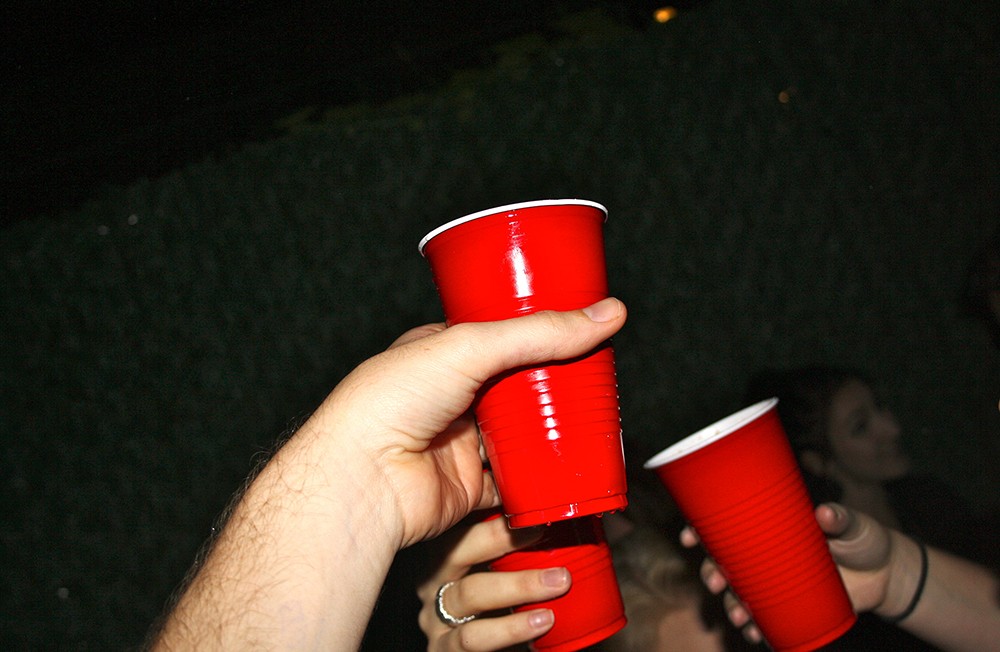In November 2015, a group of Eastern Washington University students marched through campus, some with teal tape over their mouths representing sexual assault awareness, the others chanting "Not on my red turf." That fall, the number of sexual assaults reported on or near campus had already doubled what was reported the entire year prior.
In interviews with a local TV station and on signs held by protesters, they said they wanted more education on sexual assault and consent, and better communication between sexual partners.
EWU police also were alarmed by the number of reports, says Eastern's Deputy Police Chief Gary Gasseling. They took a different tactic: All seven reports taken in those few months involved alcohol. So, the thinking went, if police can crack down on alcohol use, maybe students won't commit more serious crimes like sexual assault.
This year, EWU police find themselves arresting more students for alcohol-related offenses like minor in possession, in the hope that sexual assault arrests will decrease.
"That's a strategy we're trying new this year," Gasseling says. "We're taking a firmer approach."
EWU is not alone. Washington State University assistant police chief Steve Hansen says that WSU police look for drug and alcohol violations, knowing they may be a root cause of problems like sexual assault or property damage. This month, WSU's student-led Interfraternity and Panhellenic Councils imposed a ban on all Greek events through the end of the semester, citing a growing problem of alcohol-related incidents in the Greek community, including sexual assault.
As college campuses struggle with how to prevent sexual assault, the idea that cutting down on alcohol use is common. But it's also somewhat controversial, seen by some as an excuse for rapists or a justification for victim-blaming.
Melynda Huskey, WSU's dean of students, says it's a complicated issue. While the school wants to make sure that alcohol is not blamed for causing sexual assaults, she says it is a factor.
"People choose to commit sexual assault," Huskey says. "Having said that, it is also true that alcohol plays a role in facilitating sexual assault, and obviously that's a very serious concern."
BLAME THE ALCOHOL
When Stanford University announced this summer that it was restricting the use of hard alcohol at on-campus parties, the decision was widely derided. In the wake of a high-profile case in which a now-former Stanford student named Brock Turner — convicted of raping an unconscious woman — blamed "party culture" for his decision to commit sexual assault, the hard alcohol restriction gave the impression that Stanford bought into his story. One Stanford law professor, Michele Dauber, wrote on social media it was sad that Stanford seemed to agree that alcohol and party culture were to blame for Turner's conduct.
But many experts do see alcohol use and sexual assault as being linked. Thomas Plante, a psychology professor at Santa Clara University and adjunct clinical professor at Stanford's School of Medicine, says cutting down on alcohol use is the No. 1 way to prevent sexual assault on campuses.
"When it comes to sexual assault, the vast, vast majority of those cases involve alcohol," he tells the Inlander. "We feel if we can do a better job managing the alcohol, we can do a much better job managing the sexual assault."
According to a 2015 Washington Post-Kaiser Family Foundation poll, alcohol creates an increased risk of sexual violence. Women who responded to the poll who said they sometimes drink more often than they should were more likely to be victims of sexual assault, according to the poll.
The WSU Greek system's moratorium on events, including those with alcohol, is a "step in the right direction," says Plante. He points out that UC Berkeley's student leaders this year banned parties with alcohol at fraternities and sororities after women reported being sexually assaulted at Greek parties. For Plante, it's crucial that everyone be on board with changing the culture, and that includes more education for incoming freshmen about sex and consent.
WSU's Huskey says the university made changes to its alcohol policy three years ago in response to the 2012 death of a student named Kenny Hummel, who died of alcohol poisoning. The changes included more alcohol-free residence halls, and mandates to notify parents the first time a student is caught drinking underage.
Amy Johnson, EWU dean of students, says that Eastern hasn't considered any ban on alcohol on campus in her four years at the school. She says the university's role is to encourage students to come forward and report incidents, and give them access to support services.
"The first thing we want to reinforce is that [sexual assault] survivors are never responsible for the crime, whether alcohol or drugs or other things are involved," Johnson says.
PUSHED OFF CAMPUS
So far this school year, reported sexual assaults on or near Eastern's campus have gone down, according to Gasseling, with the EWU police. There have been four: One person reported being raped but did not want to pursue charges, another reported an assault with sexual motivation, and two other cases were arrests for indecent liberties.
That doesn't account for sexual assaults reported off campus. This year, there have been at least four sexual assaults reported to Cheney police.
Meanwhile, Gasseling says that the 23 students cited for minor in possession represents a higher number than in the past. That's on purpose.
"Are we stopping drinking? No," says Gasseling. "Are we pushing it off campus? Perhaps."
But it's hard to measure progress going by the number of reported sexual assaults. Since rape is a crime that often goes unreported, any increase could be due to victims being more comfortable with reporting. And Gasseling says the lower number of reports on campus this year may not have any correlation with a crackdown on alcohol offenses.
"It's too early to say we are having an impact," Gasseling says. "With sexual assault, it can change tomorrow night." ♦

























